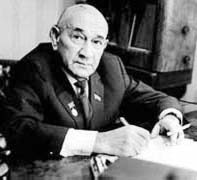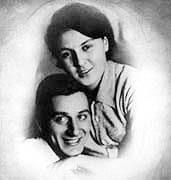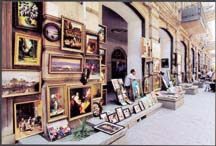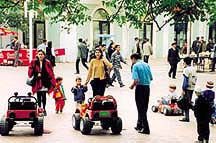|

Spring
1999 (7.1)
Pages
12-13
Baku Diary
Literary
Heritage - Baku Streets
by Jonelle
Glosch
Left: Suleyman Rustamov
Right: Rasul Reza and his wife Nigar
Rafibeyli
Baku surrounds
you with history. Buildings, monuments, stately homes-all testify
to the glory that existed at the turn of the last century. Even
street names bear witness to the rich cultural heritage of this
country. However, it's often difficult for foreigners to find
out the fascinating stories behind these things.
Recently, I was giving directions to a friend on how to find
a certain place in my "adopted city". I felt so proud
that I could identify all the relevant streets and monuments
by name. After all, how many young people who walk these streets
everyday, or for that matter, how many taxi cab drivers could
have done the same thing? I smiled, basking in the compliments,
until he asked if I knew what these names meant.
"Well,
no," I had to admit, "I don't really know the history
of the names."
My friend's
challenge sent me scurrying to see what I could dig up about
these street names that have become an integral part of my everyday
life. I spoke with friends, librarians, historians and journalists.
Each one added to the mosaic that I was collecting; each one
gave me a chance to deepen a friendship or make a new one.
Street scenes
in Baku:
Left: "The Passage" on
Nizami Street named after one of Azerbaijan's poets.
Right: Fountain Square in
downtown Baku - a favorite place to relax when the weather is
good.
New Era, New Street
Names
Since independence (1991), most of the streets in Baku have been
renamed to reflect Azer-baijan's proud national heritage. However,
people don't always know these new names because there have been
so many changes. The old names are so deeply ingrained that there's
a tendency to refer to the older, more familiar names. Old habits
die hard, they say..
In the past,
streets in Baku were usually named after ideological principles
or Russian, Armenian and other Soviet heroes. For example, both
the avenue and square in the center of Baku, once bore the name
of "Lenin", but are now called "Freedom"
(Azadlig). "Communist Street" has been renamed "Independence
Street" (Istiglaliyyat). Ironically, "Worker's Street"
(Fahla) now bears the name of "Nobel", referring to
the family of distinguished entrepreneurs - the Brothers Robert
and Ludwig who established the Nobel Brothers' Petroleum Company
in Baku in the late 19th century. Their brother, Alfred, who
held significant shares in their company, established the Nobel
Prize
in 1901.
The street named
"April 28" has now been changed to "May 28".
April marked the date that the Bolsheviks captured Baku in 1920
and set up a socialist government; May signifies the establishment
of the first Democratic Republic of Azerbaijan that had occurred
two years earlier (1918) but which the Bolsheviks totally wiped
out except for the memory. Today, Independence Day in Azerbaijan
is observed on May 28, referring to 1918, not October 18, 1991
when the USSR collapsed and Azerbaijan regained its freedom after
being dominated for more than 70 years.
Highly Literate
Like many of the former Soviet Republics, Azerbaijan prides itself
on the high level of education its people achieved. During Soviet
times, Azerbaijan boasted a literacy rate of 98 percent. As a
testimony to the esteem Azerbaijanis place on learning, the nation
now names many of its monuments, parks and streets after its
intellectual giants-writers and poets, musicians, scientists
and occasionally statesmen. And thus these names become integrated
into the vocabulary of everyday life, fulfilling one of the popular
toasts that I've heard so often, "Let us never forget our
heritage, let us remember to tell our children of the greatness
that is ours."
Ruhangiz, a journalist at Gunay newspaper, introduced me to a
collection of biographies in Russian that she had helped compile
mid-century. She had been part of a team that spent 28 years
preparing the biographies of the major scientists, philosophers
and thinkers of Azerbaijan. It was the first (and last) encyclopedia
of its kind solely dedicated to Azerbaijan's intelligentsia-a
virtual "Who's Who" of contributors to the cultural
life of Azerbaijan. It proved an excellent source for many of
the writers and poets I was looking for.
Even though this work was compiled during the Soviet era, it
seemed to me that the individuals featured in its pages were
not mere puppets of the State. Most of them had truly made an
artistic and intellectual contribution to society. Indeed, many
of them had jeopardized their own jobs and reputations; some
of them died in their attempts to express personal opinions that
ran counter to State ideology.
Suleyman
Rustamov
I discovered that it was Suleyman Rustamov Avenue that I take
everyday on my way to the office. Noisy trolley buses rumble
along that street; It's always so annoying. I never realized,
however, what a legacy this writer and playwright has left. The
encyclopedia identifies Rustamov (1906-1989) as National Poet
of Azerbaijan, Hero of Socialist Labor, Azerbaijan Honored Artist,
Azerbaijan State Prize Winner, Lenin Komsomol Prize Winner and
more. He had a very humble beginning, having been born into the
family of a blacksmith.
I first became acquainted with his works in the university English
class I teach. I asked students to bring in Azeri poems, songs
and stories so that we could discuss symbolism. One student,
Ayten, brought a lovely poem about a cottage and garden in the
summertime. It was Rustamov's work. Loved ones were the predominant
theme-"I miss the summer days when we spent time together
at the cottage by the sea. I want these days to return again-do
you? I think of you everyday from morning till night-do you miss
me, too?"
The next day Ayten brought in a small volume of Rustamov's poetry.
My favorite poem is a sad, short one about the winds of autumn:
"The wild Absheron winds blow the leaves of life away."
It seemed so prophetic and visionary to me, but my students found
it comforting that life moves in cycles-and that others have
felt these same ferocious winds so familiar to them and lived
to look back on them later in life. They interpreted the poet's
lines to mean: "Don't give up. Don't lose hope."
And so it is that these days when I hear the squeaky grind of
the trolley, my students come to mind, along with their promises
for hope-thanks to Suleyman Rustamov. (See page 52).
Samad
Vurghun
My apartment looks
out onto a very pleasant street that runs nearby the Republic
Concert Hall (Respublika Sarai) in the center of Baku. This street
is named after the poet Samad Vurgun (1906-1953). It's a bustling
street - actually quite fitting for a man who lived a rather
short, but intensely emotional life.
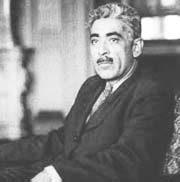  Vurghun was
a philosopher, poet, academician and teacher, Chairman of the Writer's
Union, Vice President of the Academy of Sciences, social analyst
and more. He came into his prime during the turbulent 1930s and
1940s when Stalin's repression and World War II were squeezing
the Soviet people (page 56). Vurghun was
a philosopher, poet, academician and teacher, Chairman of the Writer's
Union, Vice President of the Academy of Sciences, social analyst
and more. He came into his prime during the turbulent 1930s and
1940s when Stalin's repression and World War II were squeezing
the Soviet people (page 56).
Left: Samad Vurghun
In addition to prodigious amounts of poetry, Vurghun translated
the works of the great Russian writer Pushkin into Azeri. He
also worked to make the great classic works of the Azerbaijani
poet Nizami Ganjavi accessible
to Azerbaijanis, since the original works had been written in
the Persian language, penned in the Arabic script as was customary
during the 12th century.
Vurghun is considered one of the fathers of contemporary Azerbaijani
verse. His popularity extended beyond the borders of Azerbaijan
to other regions of the Soviet Union and even beyond, as he was
one of the few Azerbaijani writers who traveled internationally.
Both of his sons, the late Yusif (page 51 and 58), (1935-1998) and Vagif (1939-) have become
nationally recognized writers [See this issue, page 56-64, and
AI 4.1, Spring
1996].
Rasul Reza
Another
favorite street of mine is named after the poet Rasul Reza (1910-1981). My friend
Taleh put it to me this way, "You can't mention Rasul Reza
without mentioning the name of his wife as well - Nigar Rafibeyli (1913-1981) [pronounced
nee-GAHR]. These two went hand in hand, not just married life."
Their son Anar (1938- ), one of the most predominant writers
in the country, now heads the Writers' Union and is a member
of Parliament.They say Anar owes his name to an acronym built on
the first letter of each of the words-Ana (mother), Nigar, Ata
(father), and Rasul - ANAR. The root of the word means "one
who comprehends life." Thus the name itself recognizes the
influence of both his mother and father on his life. Anar often
points out that he was the "first" to bear that name.
The other day he joked that there are now so many with the name
of "Anar" that they could create their own opposition
party!
  Rasul
Reza is credited with introducing free verse to replace the traditional
verses that followed rhyming patterns. Both he and his wife were threatened by
Bolsheviks. Both of their fathers were murdered by the government
agents. Recently discovered KGB records indicate that Nigar,
too, was nearly sent into exile herself because authorities held
her in suspicion (34). Rasul
Reza is credited with introducing free verse to replace the traditional
verses that followed rhyming patterns. Both he and his wife were threatened by
Bolsheviks. Both of their fathers were murdered by the government
agents. Recently discovered KGB records indicate that Nigar,
too, was nearly sent into exile herself because authorities held
her in suspicion (34).
Photo: Anar, Rasul Reza's
son
There are many other streets that recall the literary giants
of this century - Husein Javid (20), Mikayil Mushfig (26), Abbas Sahat and Mir Jalal (43). Now I find myself
paying more attention to street names in other parts of the city.
Azerbaijanis have experienced many reversals this century. In
the midst of all the confusion and difficulties of this transition
period, it's interesting to see which parts of history they are
trying to preserve and which ones they'd prefer to put behind
them and forget. Who will be recognized to provide the moral
and intellectual strength and give courage and hope for the unknown
tomorrows of the 21st century? Who will be the models and mentors
for that familiar toast-"Let us never forget our heritage,
let us remember to tell our children of the greatness that is
ours."
From Azerbaijan
International
(7.1) Spring 1999.
© Azerbaijan International 1999. All rights reserved.
Back to Index
AI 7.1 (Spring 99)
AI Home
| Magazine
Choice | Topics
| Store
| Contact
us
|

